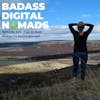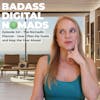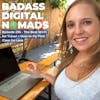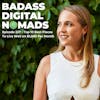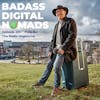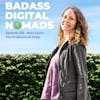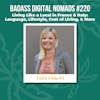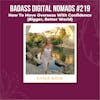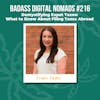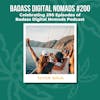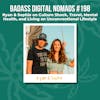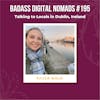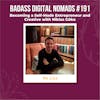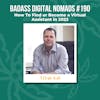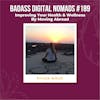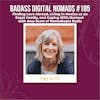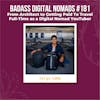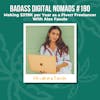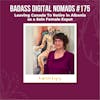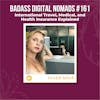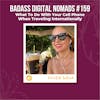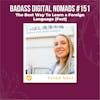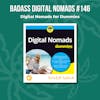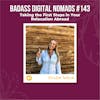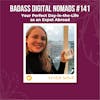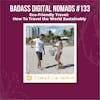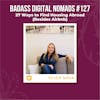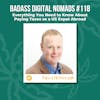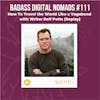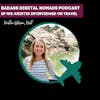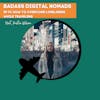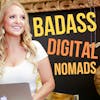How To Make Thousands of Dollars per Month Writing on Medium
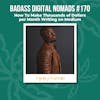
Medium's top earning writer, Ayodeji Awosika, has made nearly half a million dollars writing on Medium. In this podcast, he shares why you should consider writing on Medium (even if you're not a writer) and how much you can make.
Medium's top earning writer, Ayodeji Awosika, has made nearly half a million dollars writing on Medium. He shares why you should consider writing on Medium (even if you're not a writer). He explains the top mistakes new writers make, how Medium's algorithm works, why it's much different than blogging, and how much money people can earn within their first few months or years publishing there. Plus, Ayo and Kristin share their favorite books and life lessons from the past year.
SPECIAL OFFER:
SHOW NOTES & RESOURCES:
Books:
- Ayo's Books: Real Help, You 2.0, and The Destiny Formula
- Digital Nomads For Dummies
- Dotcom Secrets by Russell Brunson
- Made to Stick
- The Slight Edge
- $100M Offers
Podcasts:
YouTube Live on Traveling with Kristin
GoFundMe for Kristin's friend who passed away
Connect with Ayo the Author:
...........................................................................................
Connect with Kristin:
- Follow on Instagram
- Subscribe to Traveling with Kristin on YouTube
- Subscribe to Digital Nomad TV on YouTube
- Join the Badass Digital Nomads Facebook Group
...........................................................................................
Support the Badass Digital Nomads Podcast:
- Buy Kristin a Coffee
- Become a Patron
- Leave a 5-Star Review
- Buy Official Merch
- www.badassdigitalnomads.com
...........................................................................................
A special thank you to Kristin's Patrons!
Become a Patron for $5/month at Patreon.com/travelingwithkristin
...........................................................................................
Podcast descriptions may contain affiliate links of products and services we use and recommend at no additional cost to you.
Sneak Peek:
Kristin: People who don't see themselves as writers and would never say, like, I want to be a writer. You can be a small business owner, you can be a freelancer, you can be working at a restaurant, you can have any job, and you can have a side hustle writing on Medium. That can then lead to all of these other opportunities. You know, people spend so much time writing an Instagram post or writing a tweet or writing a LinkedIn post, but you don't get paid for that. But you can write on medium, get paid for it, and then you can post it on other social media sites too.
Introduction: Welcome to Badass Digital Nomads, where we're pushing the boundaries of remote work and travel, all while staying grounded with a little bit of old school philosophy, self-development, and business advice from our guests.
Kristin Wilson, Host: Hey there, Kristin, from traveling with Kristin here. And welcome to Episode 170 of Badass Digital Nomads. My guest today is Ayodeji Awosika, who is one of the top writers on Medium, a website with nearly 200 million monthly visitors. In fact, Ayo was the top earning writer on this website for six months straight. And today he's giving you his tips and learnings from seven years of writing on Medium.
You'll hear about his journey going from freelancer to online business owner and his tips for how to transition from selling your time for money to scaling your income. This interview is in two parts. The first part is lessons from his business journey. And then halfway through the interview, we talk more specifically about exactly how to make money on Medium as a writer, but not just as a writer. As an online business owner. As someone who works in marketing. As a freelancer. As anyone who wants to share your message in the world, if you need to find customers, find your target audience. Anything you want to say online that you want the right people to hear about it. Medium is the place for that. And so today he's breaking down how straightforward and realistic it is for non-trained writers, just normal people to make hundreds to thousands of dollars per month in extra income and then all of the other opportunities that can come out of it. I've made tens of thousands of dollars writing on Medium myself and a lot of you in the Facebook group and on email and in YouTube comments have asked me how that's possible.
And so Ayo and I have decided to offer a free webinar on September 7th, 2022 about exactly how to do that. So today we'll give you more of an introduction to writing on Medium so that you can judge for yourself. If it's something that you're interested in and you want to explore more. But either way. Great episode for you today.
Ayo used to work for $10 an hour at a video rental store, and now he's made half a million dollars on Medium and he has multiple online businesses in addition. So he's got tons of great life advice, business advice, you name it, you're in for a treat. And we'll link to all of the books, other podcast resources that he mentions during the show, in the show notes and just on a personal note this episode kicks off with me talking about a friend who passed away recently because it had just happened the day before. I just found out about it the day before I had the interview scheduled with Ayo and so if that's something that you have gone through recently, if you've lost a friend, a relative or a loved one and you're struggling with that, or you just want some extra help and perspective on coping with that, then I have a podcast from last year about coping with grief that I recorded when my grandmother died, and I also have a podcast called Seize the Day from the beginning of the year that I recorded after finding out that my first YouTube subscriber, TekLordz, passed away from cancer. And I also dedicated my new book to him, Digital Nomads for Dummies. So I'll link to those two podcasts in the shownotes, if that's something that would be helpful for you at this time. And then I'll also include the GoFundMe link for my friend's wife in case you feel called to contribute to that.
I hope all is well with you and I did a YouTube live this week on Sunday, so make sure to check out my YouTube channel Traveling with Kristen to see the most recent live Q&A, we had hundreds of people on their lives, so it was really fun to hop in and answer your questions. And yeah, enjoy today's conversation. Check the show notes for all the resources and the link to register for the free webinar on September 7th. And another note that this episode does have some profanity in it. Just fyi.
Podcast Interview:
Kristin: Welcome Ayo. It's so great to have you back on that. US digital nomads. Where are you right now?
Ayodeji: I'm in Minnesota. Rochester, Minnesota is where I live. Not as not as beautiful as are the our locale for the first interview were in Miami. I need to get back to Miami. That was one of my one of my favorite trips for sure.
Kristin: I know. I was just going to say, last time we saw each other, we were just sitting under the trees on the waterfront in Miami and the pandemic was just around the corner.
Ayodeji: Right.
Kristin: So crazy. How much has changed in two years? Well, I guess it's been two and a half years now, and that was February of 2020 when we did the other. It was like just a conversation hanging out in the backyard. And yeah, here we are again. So what has changed for you in the past two years?
Ayodeji: Probably the biggest thing that has changed for me over the past two years is kind of transitioning from being just a writer to really trying to build like a lot of the back end components of my business.
So I've been writing on Medium for like I don't even know how long, like seven years now. So like I've done really, really well on the platform, made a bunch of money. ButI was basically like a very highly economical, highly paid freelancer andI really wasn't what I would consider a business owner. And now I feel that way with a lot of the back end stuff I'm putting out with like the different programs I'm creating, services I've been doing for clients, stuff like that. So now I'm more focused on building like a more holistic business. And probably for the first time in my life, I haven't been writing as much as I usually do, right? So in the past, in the past like two months, I've maybe published 8 to 10 posts, which is totally uncharacteristic of me, like usually hammering at posting content every day. But I realized that there's other ways to grow your business and your brand, and I'm exploring some of those things now since I've kind of built up kind of a sizable audience. It makes sense for me at this point to help them and get more help, more people achieve the same result as me. So that's where I'm at these days.
Kristin: Yeah. Did you approach building your business in the same way that you approached writing? Because I know that you started writing seven or eight years ago. You've been writing every day and you just kind of didn't stop. So did you take those lessons from how you started with writing and then do the same thing with starting a business? Just start somewhere and keep going? Or did you have any kind of shortcuts or strategies that you brought from your writing career with you?
Ayodeji: Yeah, it's interesting. I just feel like in a way, in order to get my business off the ground a lot more, I had to like retrain my brain a little bit to actually take by using my instinct is just go, go, go. Like, great, great, great. And I've realized over time that it actually is good for me to take some time to like step back, have like a bird's eye view of everything and then actually see what makes sense to work on as opposed to just like diving in, right? So there's that concept of, you know, working in your business versus working on your business, right? So when you're working in your business, you're just flailing around like you're in the weeds or in the mud all the time. But then when you're working on your business, it's like stepping back and saying, okay, am I making the right decisions? Am I monetizing things the right way?
Other things that I've done to make sure that business runs more smoothly is now I do take the time to test out and validate all of my ideas before I put them out there. Right. So in terms of a product, like I'm not going to make a product unless somebody wants it. So the way that I do my products now, is I'll take a small sample group and say, hey, like this is, you know, this is an idea for a product I have. This is like the beta version. Would you do like they read through the scripts and I’m like do you want this? And if I get enough people to say yes and put money down, kind of like a Kickstarter campaign, right? So I kind of do like mini Kickstarter with my product projects now. So I get a small subset of like the engaged people, my audience present them with the idea, then have them validated first by paying me and then I go ahead and make it and then I sell it to everyone, to the larger audience. Right? So I created a personal development program. I think at the beginning of this year, I had sold – I sold the program before I made anything right. I just had the description and the description of what it was going to be about. I had people sign up to it. But yeah, I was making the program after, after I got to sell it.
It's a weird mental shift or mental flip for people for people to make that you can do stuff like that. But yeah, I think for a lot of people the easiest way to get ahead in business is to not don't make things that people don't want, right? So try to figure out if people want it first.
Then if it doesn't work, you can scrap it and start over. Then if it does, you know, you have your idea of validating, then you know it's going to make money.
Kristin: I think that's almost a more ethical way to do it. I mean, it's definitely the more logical way that seems illogical at the beginning because of probably the way that we're taught to do things in school and that whole if you build it, they will come mentality. But I think that testing the concept of the product that you're selling or the program and what's included in it and making sure that you're creating something that people want and then delivering on that is actually a better way to go about it because then you end up only putting in that project what people want to know about. So you're not wasting their time. Like you're not adding in extra stuff. You're not adding in extra stuff just because you think it looks good. On the list of what's included, it's like you're giving them the most impact for their time and their money and the results that they ultimately want. So yeah, I think you're right. It is a mindset shift like kind of quality over quantity and but yeah, I've seen a lot of your work over the years. You've got three books out, right? Three books?
Ayodeji: Yeah, I started the fourth, then I started fourth. My New Year's resolution to start book number four. So I'll start that January one, 2023.
Kristin: Do you know what it will be about yet?
Ayodeji: Yeah. So the basic concept is, the premise of it is about living an unapologetic life. Right. So I feel like a lot of people, especially in today's society, like you're made to feel guilty for the things you really want in life. You're made to feel you can be ostracized for having beliefs that that aren't politically correct or that other people don't hold and like a lot of people are just walking around with this weird, stifled, passive aggressive energy because like, they're just so fucking worried about what everyone else thinks.
And the whole book is just about living your life the way that you see fit and being as long as you're not hurting anyone, being like totally shameless about it, right? So for me, a lot of people obviously over the years, you know, I've gotten a lot of fire because sometimes I have according to other people, very controversial opinions. But those are the actual things that I believe. So I don't want —I want people to make a decision either way, whether or not I'm a good fit to be in their life or whether my content's a good fit. So, like, I'm not going to I'm not going to hide who I am. I'm going to let you know up front. So then you can decide like you can decide whether or not you want to interact with me. I mean, it's also a good filter for me. It's like I suppose my personality to other people is I want to be clear that I even want to talk to you. Yeah. So it's all about it. The basic premise is living. Living about how to live unapologetically and, you know, giving people strategies to do that.
Kristin: That's awesome. I'll read it because I like to continue to program my belief system in a positive way. That's going to help me continue to believe in myself and continue to face my fears every day and go out and get stuff done. Yeah, we're kind of always coming up against that fear that is part of our DNA, you know, that fear of of failing the desire for acceptance by other people in our society or in our community, whether that's on a small scale or a global scale as being part of the human race and also kind of ourselves, you know, our own ego. We can be our own worst enemy sometimes. And this has been on my mind a lot over the past couple of days, especially because one of my friends passed away this weekend. He's been in my life since I was a teenager. He's just someone that I've known since childhood, and he passed away in just an accident in Costa Rica. They're not really sure what happened, but it was some sort of training where he was holding his breath underwater and maybe he passed out or something.
So anyway, I've been just kind of grappling with that and the loss of a friend, of somebody so young, so talented with a wife and two kids and really young kids. And one of the things that I noticed as I was looking for answers and looking for I think you just want an explanation when tragic things happen, like you kind of want to make sense of it.
And so I was looking around on social media, like trying to find out what happened and seeing what his friends were posting. And I found this weird contradiction, which I suppose is along the lines of two opposing forces being true, which I'm sure you've come across in your reading and research. On the one hand, his best friends who had commented these really nice things on his social media or Bible verses or things like that. When I looked at their stories, it was the same stuff that they post every day, like a photo of their dog, a question about their opinion on some sports stuff or, I don't know, just like the random benign day to day stuff.
And I was like, What the hell? You know, like your best friend just died and you're posting a photo of your dog or you're posting like tips for, like betting on football games? And then on the other hand, reading the comments on the post that his wife made, I realized what an impact he had on so many people's lives and how when we're alive, we don't realize how many people we touch and how many people touch how many people we have an impact on. And there are people who said, I met him one time and he had this and this and this impact on me and that was 17 years ago. So I don't know, what are your thoughts on that? Like basically that the conclusion I came to is that you shouldn't care what people think when you live your life because at the end of the day, they're going to drop a comment on your Instagram page and then they're going to go back to posting photos of their dog. But at the same time, they had like a very significant interaction with you that affected their lives, hopefully in a good way. It kind of reminded me of this book I have, The Slight Edge, where the author writes about how the biggest factor in whether or not somebody will go to your funeral is whether or not it's raining. Like if it rains, then people won't go to your funeral. And he was like, What the hell? You know, like, I'm trying to do all this stuff in life and I'm so afraid of what people think. And I want acceptance so bad. And then at the end of all of this toil and blood, sweat and tears for 80 years or whatever, people aren't going to show up at my funeral because it's raining? And I know that's kind of like what I saw. And I was looking at that at two in the morning last night and just thinking about life. And anyway, what are your thoughts on that?
Ayodeji: Yeah. So you first of all, you know, very sorry for your loss. I've never had that, anyone close to me die yet. So hard to empathize, but I definitely feel that for you and me when it comes to. Yeah, it's very interesting about just the way you live your life with other people involved. So it's like on the one hand, you do want to live a life where you hope that a lot of people will show up to your funeral in that you have like left a mark. You left your mark on the world and made that that you're dead in the universe. But then also even really quickly after you die, like, yeah, people move on pretty fast, man. Like, they don't really, they don't really care that much. And it's just kind of the way of the world. And like, you can either look at it in one or two ways, like a couple of smart people I follow people like the Neval Ravikant, Alex Hormozi, they basically say like even if you were the most influential person in the world by the time you die, like three generations later, like nobody's going to give a fuck at all, right? So you can even take that one. You can either take that one or two ways, like you could. Like there's like there's like positive nihilism and like, negative nihilism. So, like, negative nihilism is just like, nothing matters. When I die, nothing happens. So, like, fuck it, life sucks, right? But then there's positive nihilism was like, nothing matters. So I might as well do everything right. So that's the way I look at it. So it's like, there's no like, honestly, when I look at it, like, build it like building like what's the point of building a business and making millions does? What's the point of getting a bunch of followers? What's the point of starting movements and projects and organizations? You know, if you're just going to die and no one's going to care at the end anyways, it's like, what? Where else are you going to do? I don't know. I don't really see the better, what's the better option?
Like some people are like some people are kind of like, you know,I want to meditate under a tree like 10 hours a day. I'm like, Cool. That's what you want to do. That's fine. So people are like, I want to, you know, run the clock out, go to work, get some beer on the weekends, watching Netflix every day. I'm like, fine, cool. Like for me, I just logically looked at it and I'm like, I'm just trying to sleep at this point. I'm just trying to see how much, how much I can get out of it. And how much I can play the game. Like it's like I've upgraded, I've upgraded my life, you know, pretty significantly from where I started, you know, financially is social media all that. And what, what the interesting thing that happens is like now I'm just used to it right now. It's just like if I like, if I was making the money that I was making five years ago, I would throw up like I would be, like, despondent, like, very bad, right? But back then I was just used to it because I was just broke, broke and broke. Right. So but then you're you're your income increases and the like, lifestyle creep and your expectations increase. And it's just like, like I said in the article I wrote in the beginning of the month, you only want the one thing, right? So the overall goal is this, that you set an impossible goal for yourself and you just keep aiming towards it and you'll never get it. But, you know, the point is the point is the process you do throughout it. And yeah, in terms of other people these days, I just want to like I'm honestly is like, hey, this is who I am. These are the things I really believe. I'm not trying to be polarizing, but like I just want you to know who I really am, you know?
And everyone's entitled to their own opinions. They have their own worldview, and I get that. So now I'm just trying to be as honest as I can about who I am, and then just try to treat other people with basic decency, kindness and respect. I want to work with people. When I work with people professionally, I want to make sure it's a win win. So I just want to do things with as much integrity as possible and really just have some fun along the way. And then when I die, die, they can't control it, so.
Kristin: Yeah. It’s just doing what you can because you can and having that positive nihilism of why not. Yeah you’re gonna fail a couple of times, you’re gonna make mistakes you’re gonna mess up but eventually the time’s gonna pass anyway and you’ll gonna look back and you’ll almost not gonna recognize the situation you’re in or your belief system from before. Like I was just in Saint Augustine with my family and going through a bunch of stuff I had stored at my parents house and it’s weird to see how much you’ve changed and how much you don’t change. Like I was always writing in journals – I found my journals from when I was in elementary school, middle school. In Costa Rica, I was always a writer, I was always documenting things but then you also uncover things that you don’t even remember happening or you don’t remember that you had and it’s kind of like, different lifetime. So I think it’s important for people to think in the day to day moment of what they want to be doing to be happy and to enjoy their day to day life but also thinking big picture and how the things that they are worrying today they probably will forget tomorrow. I like that saying - will it matter in a year from now - will it matter in ten years for now and that’s usually a good litmus test of should I care on things, should I be spending my attention on it or not. And as you mentioned when generations go by people forget and there’s certain people like Steve Jobs that made a really big impact on the world because he created iPhone and all this technology but still that fades over time and I was just in Istanbul and going to these old castles and houses of royalty from a few hundred years ago and I was reflecting on that too. I was thinking here’s a bunch of people who I’ve never heard of before because they were part of the royal families of the Ottoman empire or whatever like I’ve never even read their names in the history book and yet they had the same kind of lifestyle that we have today, they may have a nicer house but they were still dealing with the internal politics of their day, with relationships, with power struggles, with money and I’m like wow, these people are super important and I’ve literally never heard of them and they probably worried so much about their legacy and all those certain things and now they’re just a little blurb in a history museum and it was an emperor. And it’s like, okay I’m just a normal person, probably not gonna have my own historical museum or whatever that people can come and walk through and see my stuff. But it kind of made me what to seize the day more and be like who really cares because 500 years from now no one will know. And there’s probably a ton of people who did amazing stuff in their lifetimes who affected many people but nobody wrote it down. Or maybe they were illiterate and they didn’t write it down or they didn’t know how to write. So it’s kind of the same concept I guess. It’s just kind of do it and don’t care what people think. Easier said than done though.
Ayodeji: Yeah. way easier said than done. Yeah. I mean probably the number one inhibitor to living a life you want a good life is the need for validation and acceptance. It's like those two things pretty much the rule everything right. People are very, very afraid to go outside the lines where they can face social rejection. And for whatever reason, it's also rejection. It just feels really fucking bad. Like it really doesn't feel good. Like there is that deep genetic wiring, I guess they call it evolution or whatever, where you really want to make sure you fit into the tribe and stand out. So one thing, one thing I think that was helpful for me is I realized that I was never going to stop caring what people thought. I just switched it around and I was like, All right, I do care what people think, but I can change the people who I care that they're thinking about me, right?
So like, I don't really care what naysayers think about me, but I want, I want my I want my tribe, my community, my fans to think well of me and think that I, you know, produce quality work. I want people like you, like my friends, peers and colleagues that I've met along the way. Like I want to treat them well and have their respect right. So I just changed my I changed –I changed the circle of people that I'm around primarily. Right? So online I connect with so many smart, talented people. And the good thing I think about the Internet, especially with entrepreneurs like you help us feel it helps us feel a lot less alone to know that there's a bunch of other people who are doing that and we can kind of pull together in these online communities and kind of give ourselves like this mental safe haven from this really negative and kind of distracted world. And then even people in my personal life, like, so my, when it comes to the people that I connect with, you don't need to be you don't need to be an entrepreneur.
You don't need to make a bunch of money. Like it's not about that. But if you're going to be my friend, if you're going to be in my circle. You have to be like you have to be up to something. You have to be doing something. You have to be like you have you have you have to have a business or like a career you enjoy or like you have some good hobbies. Or you go to the gym like, you know, we have something to talk about. Like when I talk to my friends and be like, we're talking about we're talking about leveling up in life. We're talking about things we're working on. We're talking about things we're passionate about. Like gossip, not really my thing. You know, I watch Netflix, I like to watch movies, but like sometimes I'm around people online. I do like all you guys talk about is the accomplishments of other people and like the things you've consumed from other people. I like to talk about things we can create, so I'm always like talking to you about that stuff and like the cool thing is, you know, even like locally. So like I do a podcast with some friends in town, a lot of them reach there like reshare my reels and stuff I post on Instagram. So like I've met a lot of people who just vibe with me from just like seeing my content, right?
So it's just like you, you kind of like you put that bat signal out there, right? So if you want to attract the right people in your life, just like put yourself out there, especially like digitally and then like people will literally come to you like people stop me in the street like, Oh, you don't know me. But you know, when I saw your video a lot. And like, I made a lot of really I made a lot of really cool friends and like, met a lot of positive people. And, you know, even I'd say that the really positive people in the world, like we're a small percentage, like most of the population, is kind of depressed and anxious and negative. But there's a small group of us that even though it's a small percentage, it's like a very it's a large number, even though it's a small percentage. So we all just need to, like, band together and like, yeah, to be honest, I really feel for most people in society, I really do. I don't think they're bad people. I don't I think they're all hardworking, you know, mostly good people who just have the wrong mental inputs, but they're not like they're just done for like there's just there's not there's no hope for those people. They're just going to be stuck in the rat race forever controlled by society, mentally brainwashed forever. And if they you know, I put the message out there for them, like if they'll change their mind, but most of them just aren't going to change their mind. Most people just aren't going to do that, but most people just aren't. They're just set in their ways. Right? Changes are very rare. So I just let those people I just give those people a, you know, like peace, love. And I'm just like, I wish the best for you. But, yeah, I just. I just don't deal with them.
Kristin: Yeah. You're putting out a frequency. Everything is energy. So you're putting out what your frequency is now, what you want to help people with. And the people looking for those answers are going to find your content. They're going to be attracted to you. And sometimes you don't. I mean, you usually never know what's going to happen anyway.
So, you know, even having this conversation today is a combination of so many random things and both of us writing on Medium, which we should actually talk about now. But yeah, like even yesterday when I was talking to my friend, walking through the neighborhood, some guy rode past me on his bike and he goes, Costa Rica! Some random guy like watched my YouTube video about Costa Rica, recognized me and just kept going by. And so you just don't know who's watching, who's listening and those people that you may never talk to. You might never meet them in person, but you have an impact on their lives and you don't have to have a YouTube channel or a blog or whatever to do that. My friend who passed away, he didn't have any of that. He worked making movies, but this was all like his personal circle of friends and people that he worked with, people that he knew from school and friends of friends and whatever. So yeah, you don't have to have like some kind of platform to reach people. I think the big takeaway for me was that everyone has an impact on a massive web and a massive network of people in their lives. And it's like the more that we do and the more we interact with the opportunities that come in life, the more people we meet, the more people's lives we affect. So how has your life changed since writing on Medium? So first of all, what is Medium and what was your life like before and after you started writing on there?
Ayodeji: Yeah, absolutely. So in short, Medium is a website that anyone who wants to write on it they can write for. So you just sign up to Medium. You can become a medium writer and then Medium in terms of readers, has a membership platform where essentially, if you want to be a member of Medium, you pay five bucks a month and then you get access to articles behind a paywall.
So I got a good analogy. I like to just kind of like it's kind of like Netflix for, for writers, right? So like Netflix for readers, you pay a monthly subscription and then you basically can read as many blog posts as you want from the writers and creators who are on the platform. And if you are a writer on Medium, you get paid based on the amount of time members spend reading your articles. So when you think about it, you're like, okay, five bucks a month. Like that really doesn't sound like much, but Medium has, I believe, 25 to 30 million monthly visitors. So it adds up, right? And if you're able to, you know, it takes time. It definitely takes time. It's not a get rich quick thing at all, but if you take the time to dedicate yourself to building an audience on there, you can make a nice side hustle income which can pay the path to a full, full time writing career. Right. So for me, before I found Medium, I had dabbled with different ways to monetize my work. I believe I had published —I had published my first book, which didn't really do all that well, to be honest. I tried launching an email course and I think I forgot how many subscribers I had at the time. I tried to launch an email course, but I got zero sales, right?
But so I was – I was writing. I pretty much from day one, I wrote consistently. I never had a problem. I never got writer's block ever like once. So that wasn't the issue. But it took a while for me to figure out what to do with my writing. So I think was like November 2015. I found medium and at the time Medium didn't have the membership platform yet. But you could just get a whole bunch of traffic on medium. So I was like, okay, I'm going to use medium. Like I was doing a lot of guest posts and different websites and different things like that, trying to cobble together traffic. But then once I got on a medium, the traffic started to grow so fast I just literally ditch every other platform. I started writing exclusively on my blog, you know, copied over to medium, essentially. So I was so in the beginning I was just using it to build my list. I was like, okay, if I build a really, really, really big list, like I can create an offer and sell it like this is good. So I was just using it to build my list.
I think I published another book which do a lot better because I had an email list, right? And then it was in fall 2017, medium release the partner program and then, you know, there was whispers about it, all the writers talking about it, I was like, Well, I don't know, they're going to pay us like really? Or we can't really make any money from this. Or Is it kind of just BS? So like, All right, let me give it a try. So the first month I gave it a try, I made like 200 bucks a week. Okay? I was broke at the time, so I was happy for that. Right. And then it started increasing, increasing, increasing everything, you know, is in four figures. The next thing you know, I was in five figures. I think I made ten grand a month, like 19 months in a row. It was pretty crazy. I was top of the highest earning writer on Medium six months in a row, like back to back to back to back to back. Wow. So it yeah, it was like basically it's all about that idea, like exponential growth, right? So like for the first four years of my writing career, I barely made any money. But then in that home stretch, like, I've made more money than all those other years combined. So that just goes to show you how compounding you give yourself like time for compounding to work, right? So for not like so to date I've earned like I believe, $437,000 writing on medium. Right. And that just goes to show the cumulative effect. And I'm not saying that, you know, to be in fact, it's very unlikely that any of you guys listening to this are going to make a half a million dollars writing on Medium. But you don't need to in order to shift the trajectory of your career. So I tell people, you know, get on medium the realistic expectations on medium as it stands right now is that if you if you put in the work, you can expect to earn like the top writers these days are earning anywhere from 1 to 10, like 1 to 10 grand, ten grand’s on high end, one grand like the low end for like established writers.
It does take time for you to get there, but it's very good. It's nice. I have services like, yeah, I make two or three or four grand a month and build up my email list. Some of them have gone on to make products and offers of their own. They've gotten freelance. I've got myself and several students. We get freelance gigs off of Medium because people are like looking for writers. So you just go on a medium and then just source writers from there. There's people who get book deals for medium. I know a guy. I know a guy who just got a deal with Penguin Random House from medium. People get invited to podcast from Medium. I've been out on so many different shows on Medium and then like even just the connection, like I've met, I met you, I've met literally like dozens of like really dozens of creators who like will go on each other's shows, will promote each other's products. Like this is just like, is this an all inclusive thing where it's just like a huge community of both writers and readers and it's really the best place for especially people who are trying to become writers or people who are just in the beginning throes of building in their business, which if you want to build a business, blogging and content marketing helps you get leads for that too is like it's really a win win for for everyone involved.
Kristin: Yeah. I want to just underline the significance of what you just said, making almost half a million dollars, basically writing blog posts on medium over the past few years like that is mind boggling because the old way of making money writing online, if you were a blogger, it was to just post blog articles for one or two people to read for like seven years, ten years or whatever. Maybe put some affiliate links on there, but nobody was paying you to start your own blog. You would have to write to build up an audience. This like very linear business model, then start with affiliate links or whatever. Maybe get sponsors, maybe have sponsored posts and make a couple hundred dollars here and there for years before being able to build up an email list, get a book deal, make money and anyone and I've done it myself. I went from posting on Medium for free to making money in the writers program. I didn't know what I was doing at the time and I had just started blogging in 2018. I didn't have any blogging experience. I just started posting articles for free and I made probably like $4 or something the first month. And there were months on Medium where I made like 13 k of just from articles I had posted in the past couple of months. I had articles go viral and I mean, people can actually, whether you're officially a writer or not, if you put in the work, you can go from making a couple hundred dollars per month to $1,000 per month to $3,000 per month, potentially ten grand per month, depending on how often you publish, how long you're doing it for. There's a lot of factors that go into that, but I love the idea that anyone can do it. You don't have to be a classically trained writer or have any kind of experience whatsoever. You don't have a boss. You don't have to go out and find freelancing clients. You don't have to start an online business. You don't have to do anything other than have a writing schedule in a system for how to write articles that perform well on medium. And that's where you can just do what you did at the beginning and just throw spaghetti at the wall and see what sticks and write tons of stuff and eventually figure it out. Or now there's people like you who have experience, seven years of experience, writing on Medium. You've probably written thousands and thousands of articles. You know what works? You know what doesn't. You've gone through this whole boot camp yourself over the last seven years of figuring out how to consistently make ten grand per month and be one of or the top writer on a platform that currently has 192 million visitors per month, according to this website, according to SEMRush. And there's probably I don't know how many writers are on medium. There's room for everybody. There's probably like hundreds of thousands of people that are posting on there. But it doesn't matter when you've got millions and millions of members and a couple hundred million visitors. Like that's what I want people to realize is that you don't have to be a writer to write on medium and you can start any time. Like you can start now and then a year from now, who knows how much you could be making? Like you have plenty of clients that have quit their day jobs, right? And they weren't writers before they took your course. Can you tell us a little bit about some of your clients and the results they've gotten?
Ayodeji: Yes, so I've had several people who have been able to quit their job and go on to do great things over the years. So one, there's Niharikaa who started working with me like a year or two ago. I think —she was able to with a combination of medium income and freelance clients and some products she put together, like she was able to go from No zero audience to quitting her job and going full time in like 18 months. She became one of the most popular writers on Medium. Where is she from? she's from India. I think she was living she's lived abroad in the UK for a while. So I'm not actually I'm not sure where she's at right now, but then she, she translated those skills that she learned on Medium and then she started writing on LinkedIn and she did, she got total million views, LinkedIn 50, 50,000 followers on LinkedIn. She has her own products, her own line. So she's doing it. You just killed it. There's Anne Goon —another woman who writes in the Dating and Relationships niche. And again, it's the combination of medium income and other, you know, facilitating other things like freelance projects, things like that. She's been able to quit her job. I have another student named Khyati who did the same.
She started really taking all my techniques to heart. And she started going crazy viral, just writing these articles, like in In the Fitness and Health Vertical. There's Diana, who I worked with years back, who was in the dating relationships vertical. She also was able to quit her job. She runs a YouTube channel, too. So she's a full time creator. So there's so many people who are just in various levels. I'm like, even when I go to these animals and show people like my goal is to let them know that this isn't all just about getting rich and being like this mega superstar. So like me personally, I am like, I'm insanely ambitious. So like my goal, my goal is 7 to 8 figures, New York Times bestselling books. And like I have, I got the motivation and drive to do that. But not everyone wants to do that, right? Oh, a lot of people like a lot of people just simply replacing their income, whatever they make at their job and just how it being with writing it would be thrilling, right? So like because like for some people like yeah if you're not is three grand a month and you can get it from four medium and then not have to go to the job you fucking hey like that would be great. Right. And it's, it doesn't, it doesn't, it doesn't take much. And I think what people need to realize, especially about the online, the online game, it's like you can do it. You just have to the only there's only really two things you need to do to succeed in making money online. Follow directions, don't quit. I sit here until like it's crazy. Like I'm online all the time I see people are making money in so many different crazy ways, like writers are making money. Like, it's interesting. Like writers when people back in the day like, you know, couple of decades ago, if you tell somebody you are a writer, they would just think you're like broke and unemployed, right? They usually like writers were like not known for making money. But the landscape, the landscape has shifted to where like now like there's writers who are making for ungodly amounts of money, like it's crazy andit's just the power of creating content. So if you look at creating content 90, like 95% of people who are on social media or online, they're consumers. And so the 5% of us who actually create the content to the victor goes all the spoils, you know? So it's like if you do it, like, so you could, So here's what I like even with on Medium. So the, the way I look at it on medium is going Medium, put your work in, get, you know, get to a couple grand a month and then and then once you have the once you have some confidence, you have some money in your pocket, you're going to feel a lot better and more comfortable graduating to other levels. Like I do think that writers should eventually still graduate to other levels of online business, like, you know, putting an offer together, stuff like that. But like you said back in the old days, you got no positive feedback in the form of like money or anything. So people are just like, this is too much. Like I'm just burnt out and quit, right? But if you get a little bit of money in your a little bit of money in your pocket first and it's 10,000 times easier to get traffic on medium than it is your personal blog like trust me, I have personal blogs and like SEO and like guest posting like that's just a lot of work right to our medium. Like the traffic is built in, the readers are already there, there's different publications in there based on different subjects. Like there are people just waiting, interested in the type of content you want to write. Like they're all just they're millions of people. They're just, they're waiting for you to post. So just go there and post
Kristin: And you can copy your blog posts, like you can republish your posts on your blog anyway. So you can have both. You can have your personal blog and you can republish that content on medium. And I like what you said about, I mean, first of all, people who are in India, I'm sure they're exceeding the minimum wage in India by being able to post on medium. But no matter which country you're in, I mean a few grand per month, that's like life changing money that you can make from your house without having a boss or without having deadlines from people. Let's say if you're writing for other websites or you're writing for $0.10 per word for clients, and a lot of people are making a lot of money freelancing and with writing agencies and things like that. But what I like about Medium is that it's for beginners and any level of writers, of course, you know, you need to make sure your work doesn't have typos and things like that.
And I'm sure there's a lot of stuff to look for in your articles from how you structure them to the headlines and things like that. But people who don't see themselves as writers and would never say like, I want to be a writer, quote unquote, you can be a small business owner, you can be a freelancer, you can be working at a restaurant, you can have any job, and you can have a side hustle writing on medium that can then lead to all of these other opportunities. And even if you're writing in your own area of expertise and you have a small business or an agency or something like that, your clients, there's like a certain percentage of readers on medium that are your potential clients. And the medium algorithm is going to try to find those people because they know that those people will be interested in reading your articles. So if you're writing articles for your target client or your target customer, that's also your target reader. And that can then feed back into that loop and that ecosystem of building your email list or getting some freelancing clients that way or whatever it is. Or, you know, people spend so much time writing an Instagram post or writing a tweet or writing a LinkedIn post, but you don't get paid for that. But you can write on medium, get paid for it, and then you can post it on other social media sites too and that's something that a lot of people don't know. Can you explain a bit about the compensation structure, like how is medium able to pay writers and pay them more than they would make just getting contracted to write a blog post, for example, or to ghostwrite an article for another website.
Ayodeji: So yeah, in short, they basically take the pool of the money from all the memberships and then they dole it out based on read time. So the way you can think about it is you want to chew up as much read time for each individual member as possible. And that's like, here's an examples. Like let's say there's, let's say there's one person who's a member of Medium who pays $5/month, but they only read a small handful of articles each month. So the writers themselves will get a pretty decent chunk of their five bucks. Let’s say there’s another reader who, they’re on medium and they read tons of stuff constantly, right? So their membership funds are a little more diluted across the writers based on because they’re reading a lot more writers. So the goal is to reach the top of the pyramid so people are reading your stuff more than other people's and I'll be totally frank about medium. Like medium is 100% tell tale distributed, right? So for what? For what that means is there's a 80/20 thing going on, like the top 20% of writers make 80% of the money straight facts. But that's how everything works.
Kristin: That's I was just going to say that's how that's how the world that's how everything is.
Ayodeji: That's just how the world works. Right. So in the end, the good thing about it is that the top 20% of writers, it's not really even a product of luck either, because 80% of the writers, they just don't do shit. Right. So it doesn't matter what opportunities are out there if you don't if you don't pursue them. Right. So like I tell people, you still have to work yourself. Their practice is now you just jump on a medium and you're just an overnight success. But yeah, if you just basically if you sit here on a medium for a year, you're in the top 20 automatically.
Kristin: Yeah, there's an automatic 80/20 rule works and everything it works. And you know, your clients, your income streams or something, I don't know what that is, but it's like a very low number, publish a certain number of episodes and then they stop publishing. And so —you can get into that like if you just keep you said— if you just and don't quit, you're going to get into the top probably 1% like my podcast is the top 1% of all the podcasts in the world. And there's like 3.3 million podcasts or something like that. And it's just because I post every week. Now when you do that, you get better at it, whatever the thing is that you’re doing. So i'm sure that this podcast episode 170 is better than podcast #1 and I’m sure your medium articles today are better structured and more readable and have a higher potential of going viral than your first articles. And your third book is better than your first book. If people are serious about it and even after you publish an article per week, after a year, that's 52 articles and after two years, you know, it's over 100 articles and then maybe you want to post more often. And then that article could lead to a podcast interview, a job offer. It's so much easier to get hired by companies and get remote jobs when you have a platform as well. And you can go and be like, Yeah, I have like 10,000 followers on Medium and you're producing valuable content that's making a positive difference in the world. You're going to stand out in a pile of digital resumes as well. You might not even have to go through the normal job process of applying to jobs online. You might be able to get opportunities just from your network of contacts online, too.
So I think that was a good point that you made about, you know, finding jobs that way, finding clients and even people that have gotten book deals. What would you say are some of the beginner mistakes that people make when they start writing on Medium? Let's say if they don't get a mentor or they don’t take a course of how to do it, let’s say they just hear the idea and they’re like oh some people are making a lot of money on Medium and they’re like oh yeah and they just kind of like jump in. What are the most common mistakes you’ve seen?
Ayodeji: Yeah I know these very well. #1 is not posting enough or not posting at all. I tell people you’re going to want to post ideally twice a week, what I think would be a healthy amount. But anything less than that, you do have to do some volume on medium to make money for sure. Number two, the cryptic headlines. A lot of the writers, they don't know how to write headlines and writing headlines is again, the 80/20 thing in effect. Right. So advertising guru David Ogilvy said, you know, once you write the headline, you spent $0.80 out of your dollar already. Right? So if people won’t click on your article, it doesn't matter if you wrote the best thing ever, if they won't click through. Right? So headlines are crucial. And then the last one is really just like failing to understand how to write for an audience. So like, what I teach people is you want to find the intersection between things that you like, that you're interested in and that other people are interested in. Right? But too many new writers, they kind of treat blogging as like just like they're kind of just like vomiting out there, like diary online. And, like, people don't want to read that. That doesn't mean you can't write about your life experiences, because you can. Doesn’t mean you can’t write stories and personal narratives, you certainly can. But you have to do it forward facing so that you’re talking to an audience even if you’re telling a story about yourself. So cryptic headlines, not posting enough, and then treating your blog like a personal journalism. That’s the hugest mistakes I see beginners making is pretty much like 99% of all of them do it. And I'm just like, I look and then I try to —one thing I'm learning and it's interesting practicing as now in stepping into the role of an educator, I have to realize I have to remember go back to what it was like and think about it, right? So there's this really good book called Made to Stick by Chip and Dan Heath and then there they talk about this concept of the curse of knowledge, right? So the curse of knowledge is that after you accumulate so much wisdom, you just assume everyone else knows which you know, even illogically you don't believe subconsciously, oh yeah, you know, oh yeah. You just put a headline together and the call to action at the bottom due to lead max on them add a lead minus — sign up for ConvertKit, gets your emails off —they're like they're like, whoa, whoa, whoa slow down like what? What are you talking about? What does it lead magnet? I'm like, You don't know what a lead mag is? No, I don't –tell me. Right? Or like they don't know how to write a headline. They don't know how to structure the post, they don't know how to— I want people to get in and work with me so that you don't have to do everything that I did. Like there was no medium course when I came out. I just had to figure it out all by myself and make mistakes and go through the frustrations and the rejection and all of that stuff. Right? So you want to move things forward more quickly. And I've also invested heavily into my online education because I knew that all the information is out there for free, but I just want someone who already did it, just put it in order and make it easy for me to understand so I could just do it. So anytime I want to learn a new skill, I just take a program on it. And they've all worked well. You know, I kind of think of it like it's like building my own. Like I'm building my own degree with online courses. Right. But the difference is these classes actually help me make real money where the ones in college just get you in debt to get some bullshit job that you don't want.
Kristin: So yeah, even down to the textbook case of like making everyone buy the textbooks new every semester and not being able to resell them or whatever and then changing them every year or like updating this biology book, like does it really need to be updated again? Like Biology hasn’t changed? We judge books by their covers, we judge blog articles by their headlines and maybe the sub headlines. We judge YouTube videos by their YouTube thumbnail, which is essentially the book cover. And usually people write their article first and then they try to figure out a headline afterwards. You're shaking your head, what should they be doing instead in?
Ayodeji: The reverse. That was the exact thing that happened on the webinar. They were like, this is like an idea that might pop, right? You can kind of feel it from the headline and it dictates like the structure and like the tone and the message you're trying to get across. So yeah, definitely write the headlines first.
Kristin: Yeah, I do that with podcasts too, because at the beginning I used to record podcasts and then make a headline describing what the podcast was about. But now I've reversed it and I and I ask everybody, you know, if you could write your own title to this podcast, what would it be like? What is it that this guest wants to share with the world? And how do we explain that? We need to think about that before we start a conversation, because it's just better for everybody. You know, I respect the people's time that are listening to this and they want to get a specific thing out of it. And the title should reflect that. And it's up to us to put that thought in before, and it's up to writers to think about that before they're posting articles. If they want to have an impact, if they want people to read those articles. So awesome. Well, we're going to link to your webinar - upcoming webinar with me and you talking more about the details about how to actually make money in Medium like this is just the introduction because there's so much that goes into it but what are some of the things that people will learn in that webinar?
Ayodeji: So in the webinar people are going to learn how to create a system that’s gonna help them consistently publish so that they can make money. I am gonna talk about a lot of different resources that are put in place to make it very easy for you to write and post from start to finish. Avoid getting writer's block. I'm going to talk about the ways to be successful on medium by finding the right areas to publish, finding the ways to get noticed in front of mediums, editors and curators, which helps you get more lift on your articles And then we're going to talk about just how to how to really come up with good ideas. And we're going to have frequent apps and like live exercises we do where they give you a little peek into how the system works. So it's basically to teach you how to reliably generate ideas that have the potential to go viral, how to write those articles from start to finish and do that consistently, and then really understand how mediums, how medium works and how to get the most out of the algorithm and engaging with readers and avoid a lot of the mistakes that keep most people broke.
Kristin: Yeah, we don't even get into publications. That's a whole nother topic and we can talk about that in the webinars and not just posting on your personal profile on Medium, but how to get your stories and your articles picked up by publications within the media ecosystem to even boost the distribution and the visibility of those articles even more. You’re the highest earning writer on Medium for six months in a row. Has that actually sunk in for you?
Ayodeji: You know, it's interesting. Like, I have like I don't know, I have a hard time being content, to be honest. Like, I just do one thing and I just want more and I just keep wanting more. So, like one, like I said, one thing I do try to, I sometimes I try to remind myself in like the hobby, like do you like you've accomplished a lot in your life. Like should celebrate that a little bit. But yeah, but I, yeah, it's, it's, it's amazing. I've worked, you know, the money is cool. The status is cool. Like the one thing that's the one thing that was great for me in my life was I've known for such a long time, pretty much since I was in like middle school, that writing was something that I wanted to do and it just feels good to come full circle and be like, dude, like you actually went out there and did the things that you wanted to do and you didn't quit and you worked on something really, really hard and got good at it and people appreciate it.
So overall, this is awesome and I'm now trying to move in like I am moving more into a content space where it's like, yeah, do like build your business, keep going. Like you got to sit back and smell the roses like don't take things for granted. Like I haven't, I haven't had to wake up to an alarm or answer to a boss in like three or four years. And it's as awesome as you think it is for sure.
Kristin: Yeah. We all need some help with celebrating those accomplishments, whatever they are, those everyday wins. And one thing that I started doing about a month ago that has been really eye opening for me that anyone can do, which I learned from this slight edge book, is just to write down how I improved by 1% every day and what I can do tomorrow to get 1% better. And on days that you feel like it was just an average day or that you didn't get anything done, or maybe you feel down about yourself. If you just write how you did something 1% better, you start to realize how many ways you improve and how many things you accomplish in one day. You know, even if it's going for a one mile walk or talking to a friend on the phone like it doesn't have to be like, Oh, today my article went viral. It's like, No, how did you get 1% better today? And so that's something I've been doing to practice those small wins as well, because life is made out of moments and big goals are made out of tiny steps. So that's a lesson that I try to remember daily. But thanks so much Ayo for coming on today. And before you go, what are three books that have changed your life that you continue to read and reread because you have published three books yourself which will also link to you. But I see you have a huge bookshelf behind you and you've posted a lot on Twitter and such. So what are a couple of books that you can recommend? So people can go 80/20, right? Like what are the 20% or the 2% of books that have helped give you 80% of your success?
Ayodeji: Well, there's one there's actually one book I've only read recently, but I'm already on my third time reading because it's so good. It's called a $100 Million Offers by Alex Hormozi and he's this guy who he's just been blowing up all over the Internet lately. So in short, he started this business where he was helping gyms launch and he was launching gyms, helping them get clients and sales and then he licensed out the model and basically kind of created this online program teaching people how to launch their gyms and scale them. And he made like $100 million in like five years, like crazy in this book. And this book is all about how to make an offer. So the offer is like the thing you sell, what the person could get and putting it together in a way that's compelling to get people to buy. It's like the tagline is how to make an offer so good people feel stupid saying no and it's one of the best —It's really the best. Sales, marketing and copywriting book I've ever read in my life. Like, it's insane. And then interestingly, like there's another set of books that I'm reading right now, I'm only I'm only partway through the trilogy of those books, but just based on the first one I already know, the other two are going to be phenomenal and I know these are going to be the ones I want to reread over and over again.
It's called the first one's called Dotcom Secrets. Yeah. So I just finished reading dot com secrets and they have it right here. I have so many ideas. I'm like, holy shit. I took so many notes and like now it's like I have like anxiety were like, damn, do I want to start? I want to start getting my funnels together and all that stuff. So I'm I just finished dot com secrets. I'm in the middle of expert secrets right now. I actually started Traffic Secrets. I had bought Traffic Secrets first, but then I really I was I got halfway through it. But then he was referencing the first two and I believe like traffic was the lot like it's the last one you should read. So I went back and I started, I started dot com and I'm on expert so I'm going to finish expert this week. I'm going to do traffic next week and yeah, I'm just going to go I'm just going to go him. And it's been like interesting like now like I'm writing I'm not writing as much as I used to, but like this whole new world of like really trying to build and scale a business is like a whole new fascination. So yeah, those sort of books I think are good. Well, I know those, those set of books are going to help me make tens of millions of dollars in my lifetime, like they're.
Kristin: Yeah, it's all different phases of life. And for people who haven't heard your first podcast with me from two over two years ago, you worked in retail before writing, right? Were you working at Best Buy or where were you working in your day job? I was working at Family Video, which is kind of like a blockbuster. Okay. So you're working at a video rental store, 9 to 5, I'm sure. Maybe close to minimum wage.
Ayodeji: Ten bucks an hour.
Kristin: Ten bucks an hour. And now you're scaling this online business. But you didn't go from that to this overnight. Like people just need to start the journey and the time is going to pass anyway. So you want to see where you'll be seven years from now. You got to take that first step. And taking a first step of advice from Ayo is always a good call.
Ayodeji: Yeah. Yeah, it is. This has been a blast that reminds me even from Hormozi like a quote that he had, he was like you know if you he was like basically if you work hard for ten years, you're going to become a millionaire. But most people, most people don't want to do the part where you have to not a millionaire for nine years to finally be a millionaire. Right. And you know, I've been in the game for almost a decade. And I'm pretty certain that I'm fairly certain I'm going to hit that revenue mark probably around ten years of work. And it's like, yeah, so they say it's like ten. It takes ten years to become an overnight success. Right. You know, a lot of people, if you look at famous like Mark Manson, you know, he wrote Subtle Art of Not Giving a Fuck. He started writing into a book, came out in 2016. He started writing in 2006. Right.
So it's like it takes it takes it takes a while for you to really reach this kind of I hate to use the word bling influencer status. Remember, it takes a long time to get there, but then you can have so many wins and milestones along the way where like you can be off and running and have a decent side hustle income and have a footprint online in a year. If you go hard for a year, you're you break through the threshold for sure. And once you once you if you can create content and work at it for a year, the odds of you quitting are pretty low. Usually most people quit, like at the very, very beginning. So I used to do is like if you can grit your teeth like a year, your odds of quitting significantly decrease and then your odds of being able to reach that ten year mark significantly increase. So pretty get it in your head. So I tell people first first try to go hard for 30 days next try to make it to 90 and then after 90 try to make it to a year in my life and then my philosophy in life in general, I try not to think about the future too much anymore. Like I obviously have long range planning that needs to be done. But nowadays my entire life is like, what? What do I need to do? Like you were saying with the slight edge, what do I need to do today? How can I get better today? What can I work on that's going to move the needle today? What can I work on is going to move the needle right now, like staying in present focus and then, you know, the fruits of your effort pay off years later. But you have to do the work in the present moment for that thing, for those things to happen. So just do it. Yall got nothing else to do anyways except watch Netflix
Kristin: I always hear Ryan Holliday talking about the shows he loves on Netflix and John Lee Dumas from Entrepreneur on Fire. And I'm like, if these guys have time to watch Netflix, you know, I can watch Netflix. I was watching Netflix last night, so yeah, you could do both. But that's another way of open minded thinking that we're not necessarily taught. It's usually like one or the other. This decision, you know, the right side of the aisle or the left side of the aisle. What if you identify with parts of both sides, or what if you did both activities? You know what? If you had your job and you wrote on Medium, anything's possible. So thanks so much Ayo for coming on today and beyond the webinar, where can people follow you online
Ayodeji: So you can see my website with free articles on writing advices. www.AyoTheWriter.com you follow me on Twitter and Instagram @Ayotheauthor so A Y O the author. I do unique and individual content on Twitter and Instagram too. So I would check those out. And then lastly, I'm going to start creating content on LinkedIn as well, AYOTheAuthor—LinkedIn.com/in/AYOTheauthor so yeah I'm creating in a lot of different places, so go check all that stuff out.
Kristin: Awesome and see you guys in the Medium Writing Superstars webinar on September 7th.
I hope you enjoyed today's conversation with Ayo. He's a good friend with so much wisdom to offer. Remember to check out the show notes for resources and the link to register for the free webinar to get more information about how you can potentially make thousands of dollars per month Writing on medium.
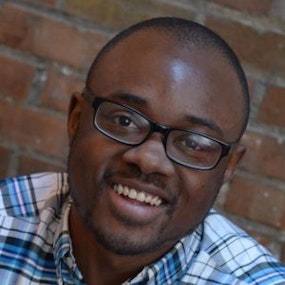
Ayodeji Awosika
Author
Ayodeji Ayodeji is a three-time author, TEDx Speaker, and top writer on medium.com with over 50,000 followers. His words reach hundreds of thousands of readers each month and millions per year. As he says on his Medium profile, he's "just a guy who loves to write about life." Sharing insights he's gained from being a student of life himself, his goal is to help people define their own version of success and give them the tools, strategies, and insights to achieve it.



























